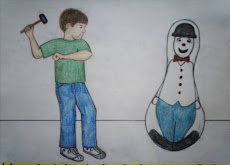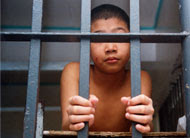Notes typed up from Friday 7th November lesson on media theory.
1. Hypodermic Syringe TheoryThis injects ideas into the consumers mind hence the 'syringe' in the title. Audiences do not question these ideas and go along with these ideas willingly.
http://en.wikipedia.org/wiki/Hypodermic_needle_model gives more information on the influence it has in the world of media.
2. Step flowOpinion leaders who influence what the public may believe on a certain issue.
Eg: Readers of the Daily Mirror may respect their viewpoint and therefore accept what they say. If the paper said children should be locked away for committing crime, the readers would agree with this.
http://www.cw.utwente.nl/theorieenoverzicht/Theory%20clusters/Mass%20Media/Two_Step_Flow_Theory-1.doc/ is an academic article giving a debate over whether opinion leaders should always force an opinion on an audience
3. Culmination (or Cultivation)Years of watching violence in the media, desensities you to it.http://1stslackerz.blogspot.com/2008/05/video-game-violence-and-real-world.html This blogspot is from a student who did a project on my topic a few years ago. She discusses in a detailed arguement, the pros and cons of desensitisation on children
4. Uses and GratificationsThis goes against the hypodermic syringe theory. It argues that audiences have different uses for the media- watching television, reading a newspaper and that we choose what we want to watch/ read.5. Reception analysisThis theory concentrates on the audience as an independant body and how they influence or read the media (also known as decoding the media) - this can be determined by mood, upbringing, age, gender and even something as simple as what sort of a day you've had!
6. Reading a text/ watching televisionDominant- otherwise known as hegemonicNegotiated-otherwise known as neutralOppositional- counter hegomonic7. RepresentationsSocietyand the individuals representation, the stereotype of people and places and how these have changed over time.
8. Good websitesHere are a few websites that have good information about media theory






